**”The Role of Yoga in Enhancing Flexibility and Injury Prevention for Endurance Athletes”**
# The Role of Yoga in Enhancing Flexibility and Injury Prevention for Endurance Athletes
Endurance athletes, whether they are runners, cyclists, or swimmers, often dedicate countless hours to their chosen sport, striving for improved performance and endurance. However, the rigors of training can lead to tight muscles, imbalances, and an increased risk of injury. In recent years, yoga has emerged as a beneficial practice that can enhance flexibility and serve as a valuable tool for injury prevention. This blog post explores the various ways yoga can support endurance athletes, including nutrition tips, exercise advice, and the overall health benefits associated with its practice.
## The Importance of Flexibility for Endurance Athletes
### Understanding Flexibility
Flexibility refers to the range of motion available at a joint. For endurance athletes, incorporating flexibility into their training regimen can lead to improved performance and reduced risk of injury. Tight muscles can limit mobility, leading to inefficient movement patterns that may result in overuse injuries.
### Benefits of Enhanced Flexibility
Enhanced flexibility allows endurance athletes to maintain optimal biomechanics during their activities. For instance, a runner with improved hip and hamstring flexibility can achieve a more efficient stride, reducing energy expenditure and enhancing speed. Additionally, flexibility helps in recovery; it can alleviate muscle soreness and stiffness after long training sessions.
## Yoga as a Tool for Injury Prevention
### How Yoga Reduces Injury Risk
Yoga promotes body awareness, teaching athletes to listen to their bodies and identify any tightness or discomfort before it escalates into an injury. Specific poses target areas that are often neglected in endurance training, such as the hips, shoulders, and lower back. Regular practice can help to strengthen stabilizing muscles, improving overall body alignment and balance.
### Key Yoga Poses for Endurance Athletes
Certain yoga poses are particularly effective for endurance athletes. Poses like Downward Dog, Pigeon Pose, and Warrior II focus on opening the hips and lengthening the hamstrings, while poses such as Cat-Cow and Child’s Pose aid in spinal alignment and relaxation. Incorporating these poses into a weekly routine can significantly enhance flexibility and prevent injuries.
## Nutrition Tips for Endurance Athletes
### Fueling Your Body for Optimal Performance
Proper nutrition is essential for endurance athletes and can complement the benefits of yoga. Here are some nutrition tips to consider:
1. **Stay Hydrated**: Hydration is crucial for maintaining flexibility. Dehydrated muscles are more prone to injury, so aim to drink plenty of water throughout the day.
2. **Balanced Diet**: Incorporate a variety of fruits, vegetables, whole grains, lean proteins, and healthy fats into your diet. Antioxidant-rich foods like berries and leafy greens can help reduce inflammation and muscle soreness.
3. **Pre- and Post-Workout Nutrition**: Consuming a mix of carbohydrates and protein before and after workouts can support energy levels and facilitate recovery. Consider a banana with nut butter pre-workout and a smoothie with protein powder post-workout.
## Exercise Advice: Integrating Yoga into Your Routine
### Creating a Balanced Training Schedule
To reap the benefits of yoga, endurance athletes should integrate it into their training schedules thoughtfully. Here are some tips:
1. **Start Slowly**: If you’re new to yoga, begin with one session per week and gradually increase as your body adapts.
2. **Complement Your Training**: Schedule yoga classes on lighter training days to promote recovery without overexerting yourself.
3. **Focus on Breath**: Yoga emphasizes breath control, which can enhance lung capacity and improve endurance performance. Practice deep, diaphragmatic breathing during yoga to carry this awareness into your endurance training.
## Health Benefits of Yoga Beyond Flexibility
### Mental Resilience
Yoga is not only beneficial for physical flexibility but also for mental resilience. The practice encourages mindfulness and concentration, which can help athletes stay focused during long training sessions or competitions. This mental clarity can lead to improved performance and a more enjoyable athletic experience.
### Stress Reduction
Endurance training can be physically demanding and mentally taxing. Yoga provides a space for athletes to unwind, reduce stress, and promote relaxation. Incorporating restorative yoga sessions can aid recovery and help prevent burnout.
## Conclusion
Incorporating yoga into the training routine of endurance athletes not only enhances flexibility and reduces the risk of injury but also promotes mental resilience and stress reduction. By integrating proper nutrition and mindful exercise practices, athletes can optimize their performance and overall well-being. Ultimately, the combination of yoga and endurance training can lead to a more balanced and sustainable athletic journey.















Post Comment